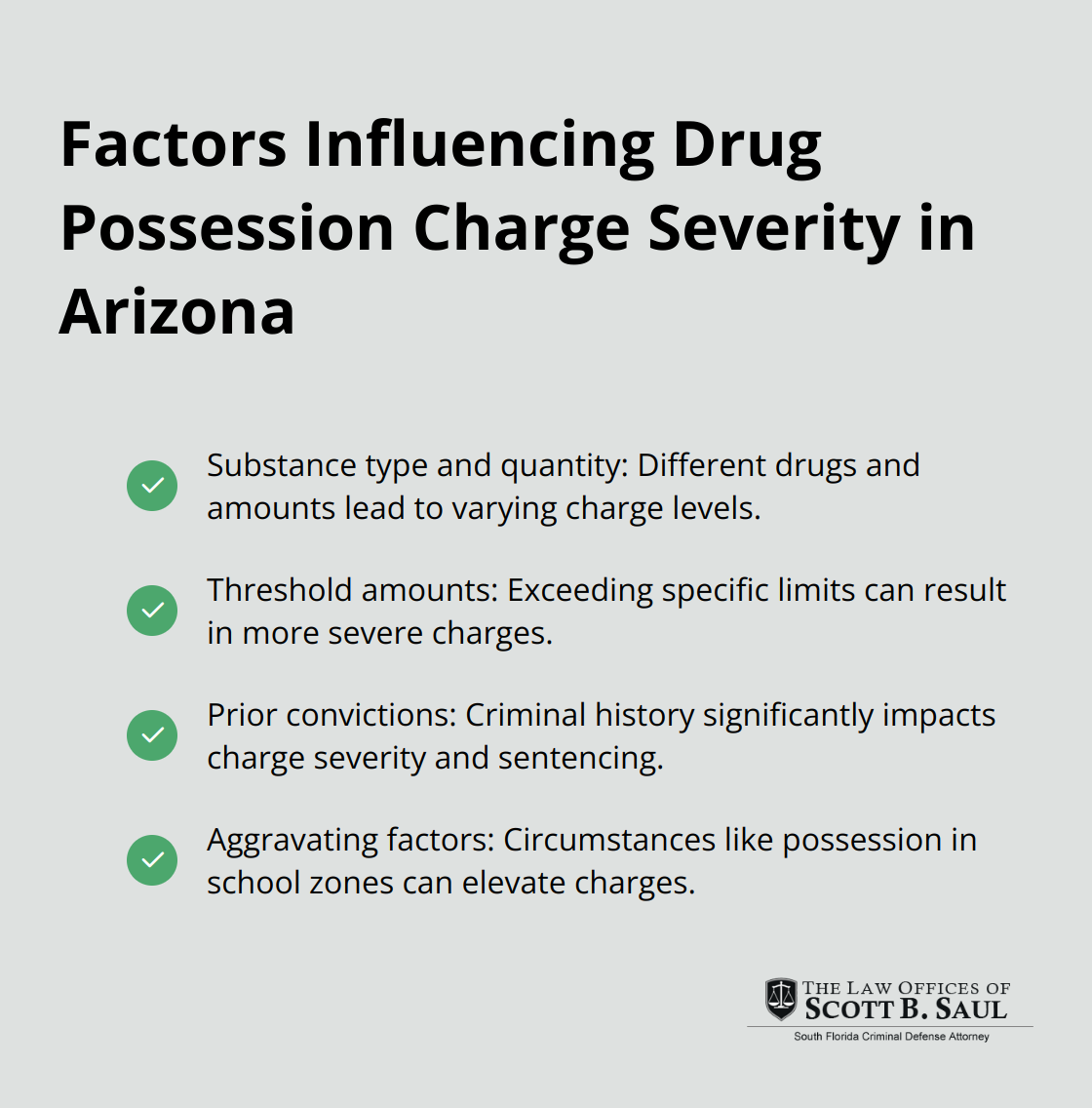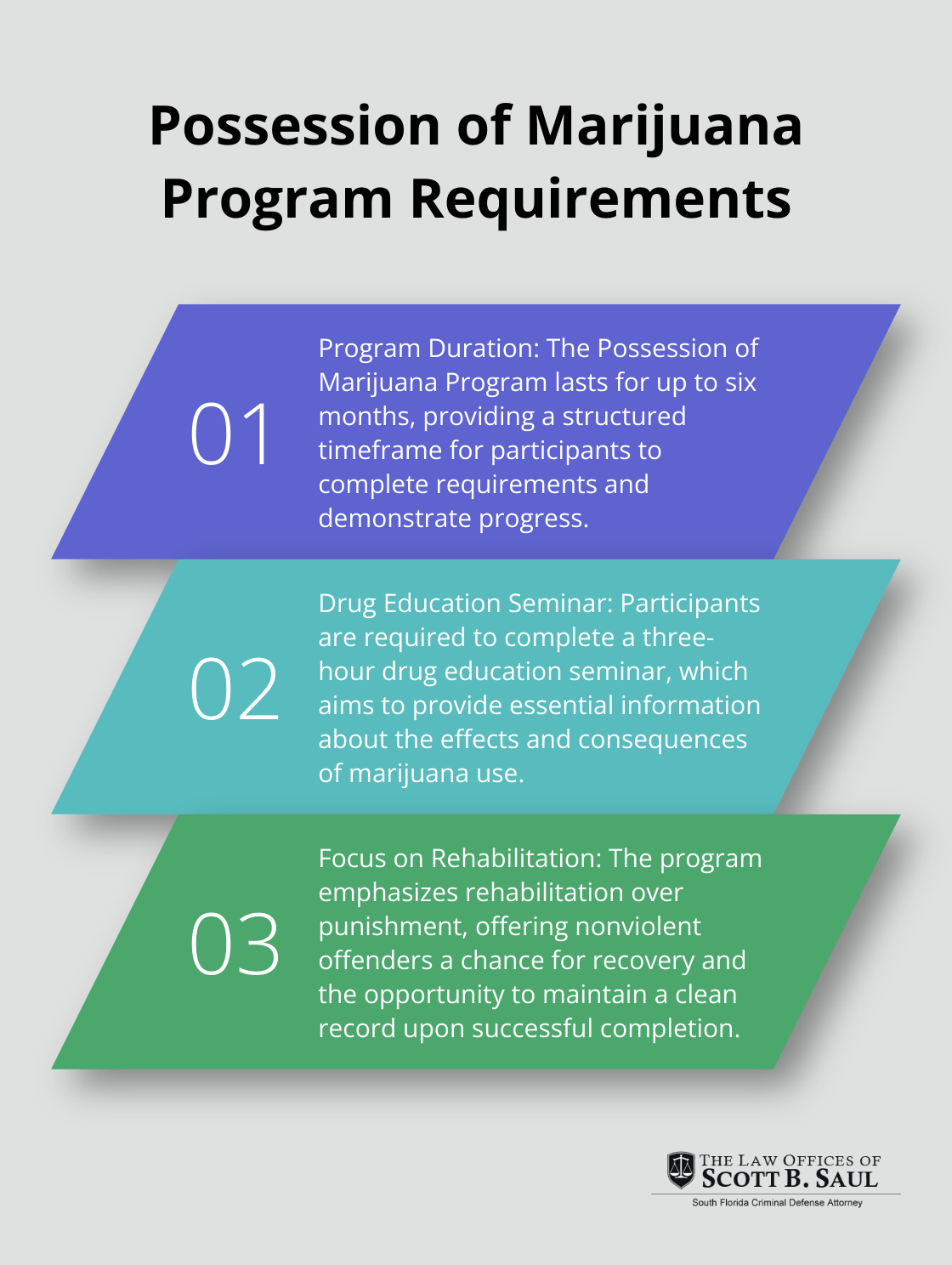Is Drug Possession a Felony in Arizona?
By : saulcrim | Category : Criminal Defense | Comments Off on Is Drug Possession a Felony in Arizona?
11th Aug 2025

Drug possession charges in Arizona can have serious consequences. At Law Offices of Scott B. Saul, we often see clients facing dangerous drug possession charges in AZ.
Understanding the nuances of these laws is vital for anyone accused of drug-related offenses. This post will explore whether drug possession is considered a felony in Arizona and what factors influence the severity of charges.
What Constitutes Drug Possession in Arizona?
Arizona’s drug possession laws carry significant legal consequences. Understanding these laws proves essential for anyone facing drug-related allegations.
Defining Drug Possession
Drug possession in Arizona can lead to jail time, fines, or probation. Knowing Arizona’s drug laws and penalties is essential. This doesn’t limit to drugs on your person. Charges can apply if drugs are found in your car, home, or a shared space you access. The critical elements are knowing possession and control over the substance.
Controlled Substances in Arizona
Arizona requires the State Board of Pharmacy to adopt the Schedule I, II, III, IV and V controlled substance designations as listed in federal law:
- Narcotics (heroin, cocaine)
- Dangerous drugs (methamphetamine, ecstasy)
- Marijuana (possession limits apply despite recent adult-use legalization)
- Prescription drugs (when possessed without a valid prescription)
Each category carries distinct penalties, with narcotics and dangerous drugs typically resulting in the most severe charges.

Personal Use vs. Intent to Distribute
Arizona drug laws distinguish between possession for personal use and possession with intent to distribute. This distinction significantly impacts charge severity and potential penalties.
Factors indicating intent to distribute include:
- Large drug quantities
- Presence of packaging materials or scales
- Substantial cash amounts
- Multiple communication devices
For instance, possessing over 9 grams of cocaine (the threshold amount) can lead to a presumption of intent to sell, escalating the charge from a Class 4 to a Class 2 felony.
Small amounts can also lead to distribution charges if other evidence suggests intent to sell. This underscores the importance of experienced legal representation when facing drug charges in Arizona.
Impact of Location on Charges
The location where drugs are found can affect the severity of charges. Possession near schools, parks, or other protected areas can result in enhanced penalties. For example, possessing drugs within 1,000 feet of a school zone can lead to more severe charges and longer sentences.
Constructive Possession
Arizona law recognizes the concept of constructive possession. This means you can face charges even if drugs weren’t physically on your person. If you had knowledge of the drugs and the ability to control them (e.g., drugs found in your car or home), you could still be charged with possession.
The complexity of drug possession laws in Arizona highlights the need for skilled legal representation. As we move forward, we’ll examine how these charges translate into felony or misdemeanor classifications and the factors that influence this determination.
Are Drug Possession Charges Always Felonies in Arizona?
Substance Type and Quantity
Arizona’s drug possession charges vary from misdemeanors to felonies. The severity depends on the substance type and quantity. Small amounts of marijuana (1-2.5 ounces) typically result in a petty offense with a fine. Larger quantities or other substances like cocaine or methamphetamine often lead to felony charges.
A person shall not knowingly possess or use a narcotic drug. Possession of dangerous drugs also falls under this category.
Threshold Amounts
Arizona law sets specific threshold amounts for various substances. Exceeding these limits can result in more severe charges and penalties.
Possession above these thresholds may lead to charges of possession with intent to sell, a more serious felony offense.
Impact of Prior Convictions
A defendant’s criminal history significantly influences charge severity and potential sentences. First-time offenders might qualify for diversion programs or probation. Repeat offenders face harsher penalties and a higher likelihood of felony charges.
For example, a first-time offender caught with a small amount of cocaine might receive a Class 6 felony charge (potentially eligible for probation). A repeat offender in the same situation could face a Class 4 felony charge with mandatory prison time.
Aggravating Factors
Certain circumstances can elevate misdemeanor charges to felonies or increase the severity of existing felony charges:
- Possession in a drug-free school zone
- Possession with intent to distribute
- Possession of drug paraphernalia alongside the controlled substance
These factors can significantly impact the prosecution’s approach and the potential penalties for the accused.

Understanding Arizona’s drug laws proves essential for anyone facing possession charges. While not all drug possession charges result in felonies, the risk remains substantial (especially for certain substances or repeat offenses). Professional legal guidance can help navigate these complex laws and work towards the best possible outcome. The next section will explore the specific penalties associated with drug possession convictions in Arizona.
What Are the Penalties for Drug Possession in Arizona?
Severe Consequences of Drug Possession
Arizona imposes harsh penalties for drug possession. Even first-time offenders face significant risks. The state’s tough stance on drug offenses can lead to life-altering consequences.
Felony Possession Sentences
Felony drug possession convictions in Arizona result in substantial prison terms. Possession of narcotic drugs (such as heroin or cocaine) typically leads to a Class 4 felony charge. This can result in a prison sentence of 1 to 3.75 years for first-time offenders. Repeat offenders or those with aggravating circumstances face longer sentences.
Possession of dangerous drugs (like methamphetamine or ecstasy) also usually results in a Class 4 felony charge. However, if the amount exceeds the threshold (9 grams for methamphetamine), it becomes a Class 2 felony. This more serious charge carries potential prison terms of 3 to 12.5 years.
Financial Repercussions
Drug possession convictions often come with hefty fines. Felony convictions can result in fines up to $150,000 (plus additional surcharges). These financial penalties can devastate individuals and their families.
A drug conviction also leads to long-term financial consequences. Many people struggle to secure employment or housing with a felony drug conviction on their record. This further complicates their ability to pay fines and rebuild their lives.
Alternative Sentencing Options
Despite Arizona’s strict drug laws, alternative sentencing options exist, particularly for first-time offenders. The state’s drug court program offers a chance for rehabilitation instead of incarceration. For example, the Possession of Marijuana Program lasts for up to six months and requires participants to complete a three-hour drug education seminar.
Proposition 200, passed in 1996, requires probation rather than jail for nonviolent personal drug users. It also mandates that drug users who commit violent offenses serve 100% of their sentences. This approach focuses on rehabilitation rather than punishment for nonviolent offenders, potentially offering a path to recovery and a clean record.

These alternative programs can change lives. However, navigating these options requires experienced legal representation to ensure the best possible outcome. It’s important to note that while these alternatives exist, they’re not guaranteed. The specific circumstances of each case (including the type and amount of drug involved, prior convictions, and other factors) all play a role in determining eligibility for these programs.
Final Thoughts
Arizona’s drug possession laws carry severe consequences. Dangerous drug possession in AZ can result in felony charges, substantial prison time, and hefty fines. The severity of these charges depends on factors such as the type and quantity of the substance, prior convictions, and the circumstances surrounding the arrest.
While Arizona’s stance on drug offenses is tough, alternatives to incarceration exist for some offenders. Programs like drug courts and probation-based rehabilitation offer paths to recovery and a chance to avoid the most severe penalties. However, access to these programs isn’t guaranteed and often requires skilled legal navigation.
If you face drug possession charges in Arizona, you should take immediate action. Your first step should be to contact an experienced criminal defense attorney who understands the nuances of Arizona’s drug laws. At Law Offices of Scott B. Saul, we bring over 30 years of expertise in criminal defense (including cases involving tourists and foreign travelers). Our team’s background in both federal and state prosecution provides unique insights that can be invaluable in building a strong defense strategy.
Archives
- November 2025 (8)
- October 2025 (8)
- September 2025 (9)
- August 2025 (8)
- July 2025 (8)
- June 2025 (9)
- May 2025 (9)
- April 2025 (8)
- March 2025 (9)
- February 2025 (8)
- January 2025 (9)
- December 2024 (10)
- November 2024 (5)
- July 2024 (2)
- June 2024 (2)
- May 2024 (2)
- April 2024 (2)
- March 2024 (2)
- February 2024 (2)
- January 2024 (2)
- December 2023 (2)
- November 2023 (2)
- October 2023 (2)
- September 2023 (2)
- August 2023 (1)
- July 2023 (2)
- June 2023 (2)
- May 2023 (2)
- April 2023 (2)
- March 2023 (2)
- February 2023 (2)
- January 2023 (2)
- December 2022 (2)
- November 2022 (2)
- October 2022 (2)
- September 2022 (2)
- August 2022 (2)
- July 2022 (2)
- June 2022 (2)
- May 2022 (2)
- April 2022 (2)
- March 2022 (2)
- February 2022 (2)
- January 2022 (2)
- December 2021 (2)
- November 2021 (2)
- October 2021 (2)
- September 2021 (2)
- August 2021 (2)
- July 2021 (2)
- June 2021 (2)
- May 2021 (2)
- April 2021 (2)
- September 2020 (5)
- July 2020 (4)
- June 2020 (4)
- May 2020 (4)
- April 2020 (5)
- March 2020 (4)
- February 2020 (4)
- January 2020 (4)
- December 2019 (1)
- November 2019 (4)
- October 2019 (4)
- September 2019 (4)
- August 2019 (4)
- July 2019 (5)
- June 2019 (4)
- May 2019 (4)
- April 2019 (4)
- March 2019 (4)
- February 2019 (4)
- January 2019 (4)
- December 2018 (4)
- November 2018 (5)
- October 2018 (5)
- September 2018 (4)
- August 2018 (4)
- July 2018 (7)
- June 2018 (4)
- May 2018 (4)
- April 2018 (8)
- March 2018 (4)
- February 2018 (4)
- January 2018 (4)
- November 2017 (4)
- October 2017 (4)
- September 2017 (4)
- August 2017 (7)
- July 2017 (6)
- June 2017 (4)
- May 2017 (4)
- April 2017 (4)
- March 2017 (4)
- February 2017 (7)
- January 2017 (4)
- December 2016 (7)
- November 2016 (4)
- October 2016 (4)
- September 2016 (10)
- August 2016 (4)
- July 2016 (4)
- June 2016 (4)
- May 2016 (4)
- April 2016 (4)
- March 2016 (4)
- February 2016 (7)
- January 2016 (4)
- December 2015 (5)
- November 2015 (4)
- October 2015 (7)
- September 2015 (4)
- August 2015 (4)
- July 2015 (13)
- June 2015 (9)
- May 2015 (8)
- April 2015 (6)
- March 2015 (4)
- February 2015 (4)
- January 2015 (4)
- December 2014 (4)
- November 2014 (4)
- October 2014 (4)
- September 2014 (3)
Categories
- Adjudication (1)
- Bankruptcy (1)
- Burglary Crimes (3)
- calendar call (1)
- Car Accident (1)
- Criminal Defense (372)
- Cyber Crimes (7)
- DNA (1)
- Domestic Violence (9)
- Drug Crimes (5)
- DUI (12)
- Embezzlement (1)
- Environmental Crimes (4)
- Expungement Law (2)
- Federal Sentencing Law (3)
- Firearm (3)
- Forgery (4)
- General (82)
- Healthcare (3)
- Immigration (1)
- Indentity Theft (1)
- Insurance (5)
- judicial sounding (2)
- Juvenile Crimes (4)
- Manslaughter (4)
- Money Laundering (3)
- Organized Crime (1)
- Racketeering (1)
- Reckless Driving (3)
- RICO (3)
- Sealing and Expunging (2)
- Sex Offense (1)
- Shoplifting (1)
- Suspended Driver's License (1)
- Traffic (4)
- Trending Topics (1)
- White-collar Offenses (1)

